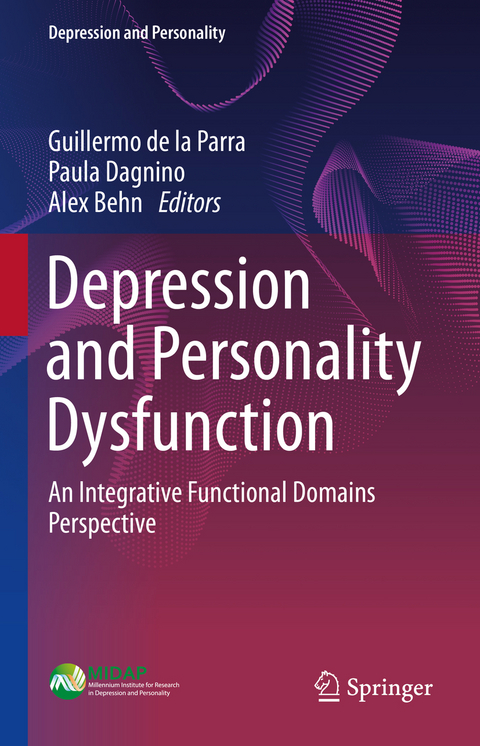
Depression and Personality Dysfunction
Springer International Publishing (Verlag)
978-3-030-70698-2 (ISBN)
This book analyses the clinical interaction between depression and personality dysfunction to help clinicians better understand and treat patients with complex depression. It proposes an innovative perspective to clinical work that moves away from a disorder-centered approach to a person-centered approach by analysing complex depression through the lens of functional domains related to personality functioning and applying Research Domain Criteria to diagnosis and treatment planning. By doing so, it aims to contribute to the development of precision psychotherapy by applying the principles of precision medicine to mental health care.
The book is divided in two parts. Chapters in the first part review problems in five domains of personality dysfunction that drive complex depressive presentations - identity, affect regulation, self-other regulation, social dysfunction and self-criticism - and the neurobiological findings underlying them. In the second part, authors present integrative models of depression and personality dysfunction and their implications for diagnosis and treatment.
Depression and Personality Dysfunction: An Integrative Functional Domains Perspective is a scientific and clinical guide for the understanding and treatment of patients with depression complicated by personality dysfunction. It will be a useful tool for clinicians looking for resources to develop a more person-centered and evidence-based approach to mental health care.
Guillermo de la Parra, M.D., Ph.D. is full professor of Psychiatry at the Department of Psychiatry, School of Medicine, Pontificia Universidad Catolica de Chile. Dr. De la Parra received his Ph.D. from Ulm University, Germany. He has developed three interest areas: First, he has been interested in offering therapeutic services to socioeconomically vulnerable patients. For this reason he has founded psychotherapy units in public institutions and at the University Outpatient Clinic, as a space for care, research, and teaching. Second, as former president of the International Society for Psychotherapy Research, he has been interested in bridging the gap between cultures and also between research and clinical practice, applying and assessing evidence-based models in Psychotherapy Units. Third, his research within the frame of the Millennium Institute for Research in Depression and Personality (MIDAP), in a country where depressive illness is relevant, has been devoted to the depressive patient, his/her personality style, and personality structure in its relation to depression, developing models for a better treatment of these patients in primary care. Paula Dagnino, Ph.D. is a clinical psychologist and accredited supervisor. Assistant professor and head of the Faculty of Psychology clinical area at Universidad Alberto Hurtado, Chile. She received her Ph.D. in Psychotherapy from Pontificia Universidad Catolica de Chile, Universidad de Chile, and Heidelberg University, Germany. She has been interested in depression, personality, and process research, mainly due to its clinical impact. Other interests have been training psychotherapists for the clinical work on public health. She has received research grants on Depression and Personality, therapeutic focus, and brief psychodynamic process. She is also an adjunct researcher at the Millennium Institute for Research in Depression and Personality (MIDAP), and the Director of the Center for Psychotherapy Research, CIPsi in Chile. Alex Behn, Ph.D. is a clinical psychologist in private practice and an assistant professor of psychology at the School of Psychology at Pontificia Universidad Catolica de Chile. Dr. Behn received his PhD in Clinical Psychology from Columbia University in the City of New York after completing a doctoral internship at Montefiore Medical Center. Dr. Behn is also a researcher at the Millennium Institute for Research in Depression and Personality (MIDAP), where he is also Director of Research. Dr. Behn's research focuses on Borderline Personality Disorder, Depression and using technology to aid in detection and treatment of personality dysfunction.
1.Depression and Personality Dysfunction: Towards the Understanding of Complex Depression.- 2.The Functional Domain of Identity.- 3.The Functional Domain of Affect Regulation.- 4.The Functional Domain of Self-Other Regulation.- 5.The Domain of Social Dysfunction in Complex Depressive Disorders.- 6.Neurobiological findings underlying personality dysfunction in depression: From vulnerability to differential susceptibility.- 7.The Functional Domain of Self-Criticism.- 8.Complex Depression and Early Adverse Stress: A Domain-Based Diagnostic Approach.- 9.Complex Depression in High-Pressure Care Settings: Strategies and Therapeutic competences.- 10.Modular Treatment for Complex Depression According to Metacognitive Interpersonal Therapy.- 11.Where do we come from? Where are we moving to? Towards the development of precision psychotherapy.
| Erscheinungsdatum | 30.07.2021 |
|---|---|
| Reihe/Serie | Depression and Personality |
| Zusatzinfo | XXI, 297 p. 6 illus., 5 illus. in color. |
| Verlagsort | Cham |
| Sprache | englisch |
| Maße | 155 x 235 mm |
| Gewicht | 647 g |
| Themenwelt | Geisteswissenschaften ► Psychologie ► Angst / Depression / Zwang |
| Geisteswissenschaften ► Psychologie ► Klinische Psychologie | |
| Geisteswissenschaften ► Psychologie ► Persönlichkeitsstörungen | |
| Geisteswissenschaften ► Psychologie ► Psychoanalyse / Tiefenpsychologie | |
| Medizin / Pharmazie ► Medizinische Fachgebiete ► Psychiatrie / Psychotherapie | |
| Schlagworte | Complex Depression • Functional Domains of Personality • Major depression • Personality disorder • personality dysfunction • Person-Centered Psychotherapy • Precision Psychotherapy • RDoC • Research Domain Criteria |
| ISBN-10 | 3-030-70698-2 / 3030706982 |
| ISBN-13 | 978-3-030-70698-2 / 9783030706982 |
| Zustand | Neuware |
| Informationen gemäß Produktsicherheitsverordnung (GPSR) | |
| Haben Sie eine Frage zum Produkt? |
aus dem Bereich


